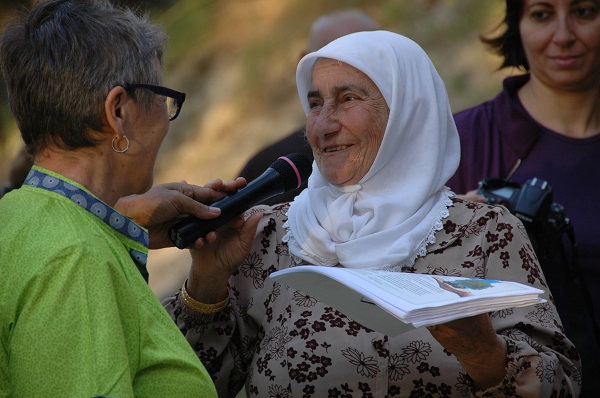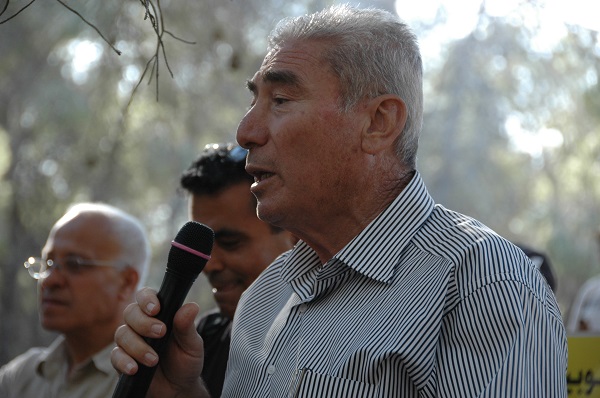Among the ruins of the destroyed Palestinian village of Lubya, a group of South African Jews publicly apologizes to descendants of Lubya’s refugees for their donations to the Jewish National Fund, donations that were used to plant part of the forest that covers the village’s remains.

In a forest glade set atop the remains of the destroyed Palestinian village of Lubya in the Lower Galilee, a delegation of South African Jews made a public apology to the descendants of refugees from Lubya and their families Friday evening.
The event, a joint initiative of the South African delegation and representatives of Lubya’s displaced persons, concerned the use of donations made by the South African Jewish community to the Jewish National Fund (JNF), which went toward planting the “South Africa Forest.” This forest is part of the larger Lavie Forest that covers what was once Lubya, which was depopulated on July 16-17, 1948. Kibbutz Lavie, founded in 1949, was also established on the lands of the former village.
Witnessed by over a hundred Palestinians and Israelis, the South African delegation publicly acknowledged that the Nakba had taken place, accepted the role that their donations to the JNF had in covering up historical injustices and apologized for the personal part they played in this sequence of events.
Prior to the ceremony, participants were taken on a tour of Lubya, organized by Zochrot – an Israeli NGO advocating for awareness of the Nakba – and the Association for the Defense of the Rights of the Displaced People (ADRID). Both organizations were also involved with the ceremony.
As the tour wound around paths strewn with the stones that once supported houses, Muhammad Kaial, a board member of ADRID, explained the significance of the event: “We want people to know the truth about what took place in 1948. This apology is a start, and an important step.”
Standing among the remains of Lubya’s cemetery Muhammad continued on to talk about the expulsions and dispossession that took place during the Nakba.
“There are many things we cannot forget,” he said. “My father, a few weeks before he died at the age of 83, suddenly asked me at two in the morning: ‘Didn’t they leave anything for us? Not even one dunam?'”
As he finished speaking, the sound of metal on metal could be heard: members of families from Lubya were hammering a sign into the ground to mark the presence of the cemetery.

In the dwelling below the cemetery, the ceremony was opened by Nayif Hujji, a representative of Lubya’s displaced persons. Greeting the participants and organizations present, he also welcomed the South African Jewish group, telling them: “You have come home, so please feel at home.”
Hujji spoke of the call issued by Palestinian refugees for the right of return, and acknowledged the descendants of Lubya’s refugees who had flown in from Denmark and Sweden for the event.
For the Palestinians and Israelis present, the event was symbolic of the process necessary for moving forward in the conflict. “We have no problem living with Jews in this country. We want coexistence […] But coexistence here can only come after racism has ended,” said Wakim Wakim, the head of ADRID. Zochrot’s Amaya Galili reiterated the organization’s call for “the Jewish-Israeli public to take responsibility for the Palestinian Nakba, and to take an active part in redressing past wrongs.”
“We are here as Jewish South Africans to acknowledge that the Nakba took place … We cannot undo the past, but we commit to undoing ‘greening’ as an act of obliteration,” said Shereen Usdin, spokesperson for the South African delegation. South African Jews “understand the importance of joint struggle,” Usdin added, calling on “Jews around the world to come here and acknowledge the Nakba.”

Members of the delegation read and handed out the pledge, which has been signed by over 200 South African Jews, to representatives of the Lubyan refugees. In particular, the pledge drew attention to and condemned three primary activities by the JNF:
The administration of land on which scores of former Palestinian villages had been located prior to the 1948 War in a manner calculated to destroy both the physical memory and evidence of these villages; the consolidation of land for the purposes of exclusive Jewish control, ownership and use; and active participation in the campaign to ‘Judaise’ the Negev through the forced removal of Bedouin inhabitants from their land.
The pledge continued by pledging solidarity with the former inhabitants of affected villages, noting that such an act of displacement contravenes the United Nations Declaration of Human Rights, and was an undertaking that “no moral society can condone.”
The ceremony ended with the singing of the Palestinian national anthem in the fading light. The participants dispersed into the remains of the day, having reached the culmination of a five-year project. There was a sense throughout that the initiative carried particular weight due to the national history that South Africans carry with them; indeed, Nelson Mandela was invoked during the proceedings, as was the shadow of apartheid.
Among the participants there was an understanding that this ceremony represented the first of many steps that must be taken in this direction, and that ultimately an official apology from Israel for the Nakba must take place. Until then, Jewish communities around the world would do well to follow the South African group’s lead. As Muhammad from ADRID said: “We want reconciliation. But before reconciliation, we need to know the truth.”


